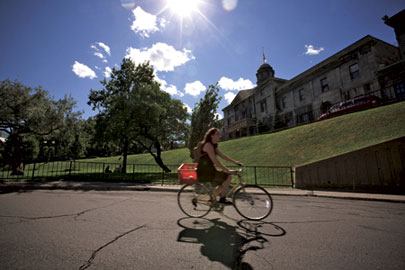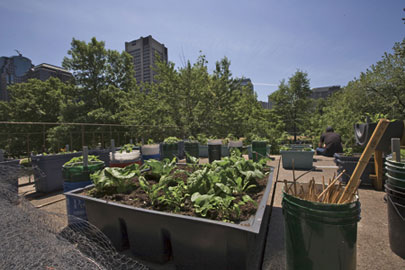SUSTAINABILITY ISSUE
Reading, ’riting and recycling

Points for pedal power
Turning on your television is bad for your health, your mental health that is. It seems like every newscast, every talk show and every news magazine features yet another expert prophesizing that the end is nigh. Extreme weather, global warming, depletion of the world’s fish stocks, a porous ozone layer, blue algae—take your pick for this week’s harbinger of doom.
But while most of us just throw up our hands and bemoan our individual insignificance and impotence against this monster of our own design, there are those among us who still believe there’s a stand to take. “If the choice is between giving up and drowning or kicking my legs and swimming, I’ll start kicking,” says Kathleen Ng, Environmental Officer, Environmental Health and Safety.
Included on these pages are just some of the important initiatives undertaken by McGillians in their attempt to return the world to a more sustainable state. Immediately below, you’ll find a small sampling of some of the university’s green projects and activities.
Rethink McGill—McGill University’s environmental campaign and a clearinghouse for virtually all the university’s environmental activities. www.mcgill.ca/rethink.
The McGill Bike Loan Program (Mac Campus, Laird Hall, Room 101)—Anyone with a valid McGill I.D. can borrow one of ten bikes for up to three hours to do with as they please. Cross campus in an eco-friendly way, go shopping or take a bike tour of the Morgan Arboretum nearby.
Online Green Tour (www.mcgill.ca/stewardship/greentour)—A fully illustrated online tour of the wide range of tree species and gardens situated on campus. Each slide features a sampling of trees from the species located on a campus map, which can be zoomed in for better viewing.
Biodiesel pilot project (Gault Nature Reserve)—During the summer months, many of the Reserve’s vehicles run on fuel that is half diesel and half biodiesel—a magical mix of converted cooking oil and animal fat that significantly reduces greenhouse gas emissions.
Lady Meredith House (corner Peel and Pine)—It may have been built in 1897, but “Ardvarna” (as it was originally named) boasts a cutting-edge geothermal exchange system that keeps temperatures comfortable year-round by tapping into the earth’s natural cooling and heating properties through a series of deep running pipes. This system saves the building nearly 40 per cent in annual heating and cooling costs.
Greening Events workshops—Offered through Human Resource’s Staff Development program, these workshops brief participants on how to run the most eco-friendly meetings ever. To register: www.mcgill.ca/hr/staffdevelopment/registration.

The Edible Campus container garden next to Burnside Hall supplies food to Santropol Roulant’s meals-on-wheels program.

